May 30, 2025 – Day 103 of the 100-Day Dharma Talk, Friday Dharma Q&A Summary
Hello. Today marks the 103rd day of Venerable Pomnyun Sunim’s 100-Day Dharma Talk series. Today is the day when the Friday Dharma Q&A, open to all citizens, is held, and it’s also the day when the 100-Day Dharma Talk comes to its grand finale.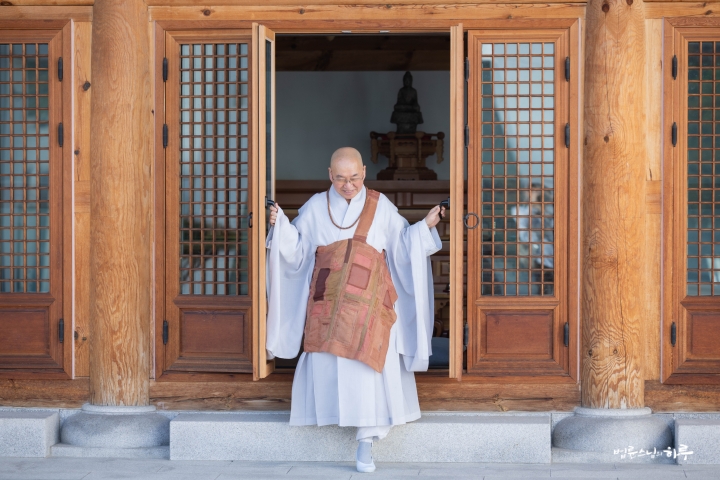
Over the past hundred days, Sunim has tirelessly turned the wheel of Dharma. Towards the end of 100 -Day Dharma Talk series, his voice became hoarse and he caught a cold, so he visited the hospital first thing in the morning to receive treatment as soon as it opened. He had tried to avoid going to the hospital, but had no choice. After receiving IV fluids and regaining stability, he hurried to the Jungto Social and Cultural Center in time for the lecture.
From early morning, volunteers were welcoming citizens who had come to attend the Dharma Q&A. On this last Friday of May, as the green foliage deepened, the breeze blowing through the alleys cooled the sweat, making the citizens’ steps lighter.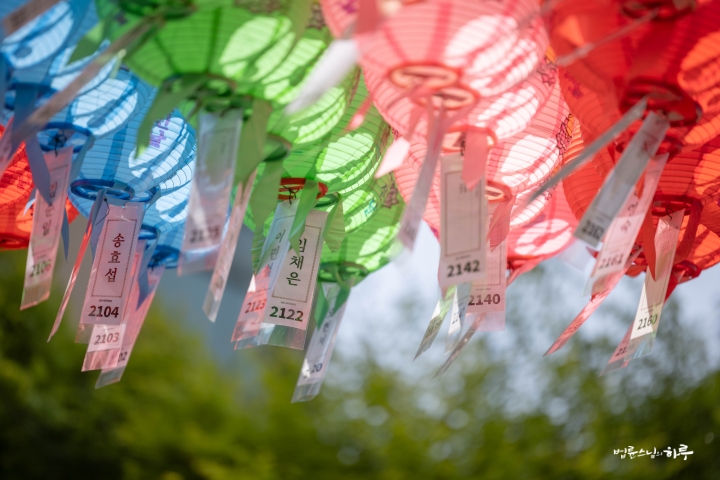
At 10:15 AM, everyone recited the Three Refuges and Words for Practice together. With about 280 citizens seated in the underground auditorium and 3,500 people connected via YouTube live stream, Sunim gave his opening remarks.
“Today is the final lecture of the 100-Day Dharma Talk series. I see many people have come because it’s the last one. Thank you. Is there anyone who attended every single dharma talk without missing one during these hundred days?”
A few people raised their hands.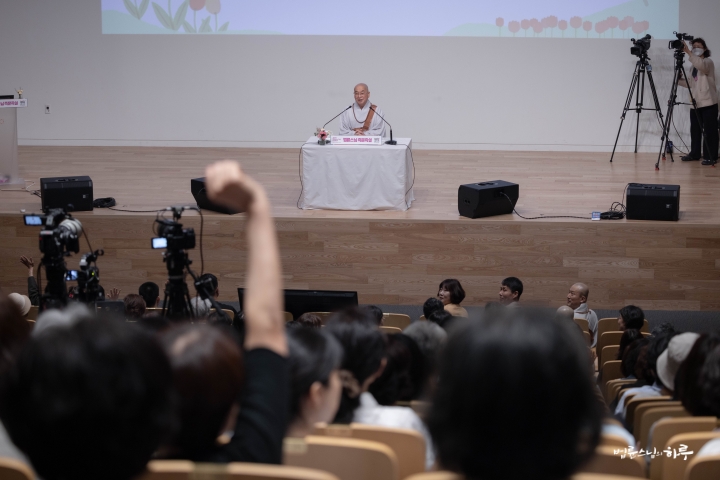
“That’s impressive. Even though the 100-Day Dharma Talk is ending, lectures will continue, so please keep attending. Going forward, we plan to hold offline Friday Dharma Q&A sessions about once a month. Online sessions will continue as usual every Friday. When I’m in remote overseas locations without internet connection, we’ll have to do recorded broadcasts. I hope you’ll understand.”
For the next hour and a half, five people asked Sunim questions. The first questioner sought advice on how to work at one company for a long time, explaining that whenever difficult situations arise at work, she feels like running away and easily end up quitting.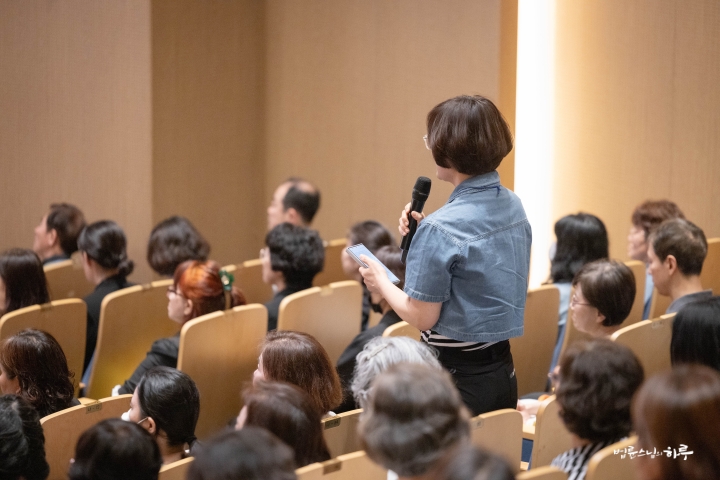
Whenever Things Get Tough, I Want to Quit My Job. How Can I Strengthen My Resolve?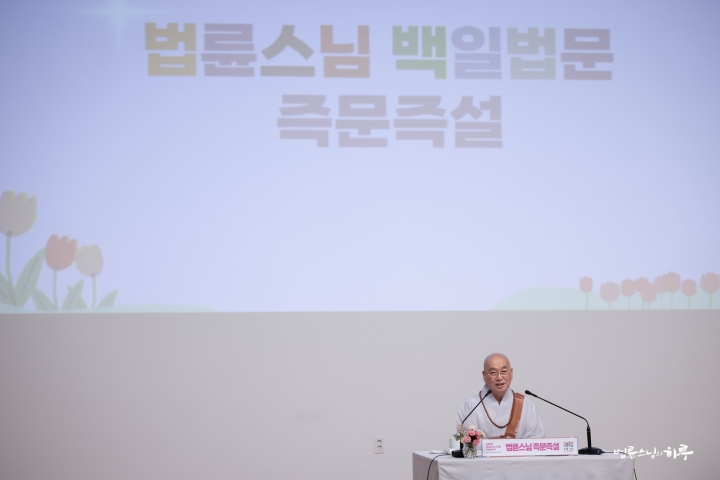
“Start by letting go of the idea that you must stay at one company for a long time. Life requires diverse experiences. If you only work at one company, it’s difficult to gain varied experiences. It’s good to work at this company and that company too. The same applies to meeting people. If you only meet one man your whole life, it could be boring. It’s good to meet this man and that man too. In the past, remarriage was prohibited by ethics or law, so there were no opportunities, but now we’re free, aren’t we?
So don’t view changing jobs only as a disadvantage—think of it as an advantage. For example, if I leave someone first, I might be criticized as a playboy, but if the other person leaves me, I’m free from that criticism. That’s why you don’t need to fear being left when dating. I don’t mean you should date indiscriminately. I mean you don’t need to cling—if the other person leaves, you can meet someone else. If you don’t like your job, you can leave, and even if you’re fired, there’s not much to worry about. You can just join another company. With this mindset, you won’t be bound when meeting romantic partners, and you won’t be bound at work either. This is true freedom.
However, if I want to maintain a certain relationship, I need to be helpful to that relationship. To maintain relationships with people, you need to provide emotional comfort or material assistance, and at work, you need to contribute to the company’s benefit. Usually, conflicts arise and relationships break because we only try to get something from the other party. 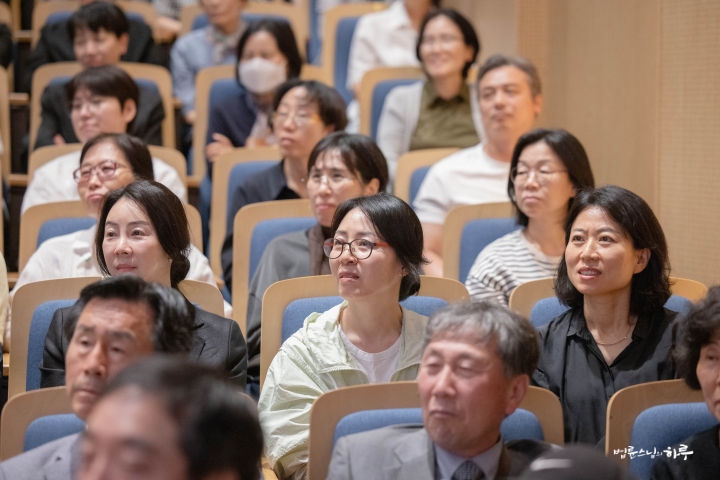
First, let go of the idea that ‘I must stay at one job for a long time.’ You don’t need to think ‘Am I inadequate?’ just because you change jobs frequently. Getting fired isn’t a bad thing, is it? The same goes for when a boyfriend leaves. There’s no need to cling to the other person. If they left because they disliked me, that was their choice, so there’s no reason for me to be hurt.
Second, whether it’s a job or a relationship, if you want it to last, you need to be someone who is helpful. For example, let’s say I charge each questioner one million won for a Dharma Q&A session. If people think it’s not worth that amount, fewer and fewer people will come to see me. But since I don’t charge anything like I do now, from the questioner’s perspective, if it’s helpful, they’re grateful, and if it’s not helpful, there’s no loss. So they can keep coming. When there are mutual benefits like this, relationships continue.
Third, if you dislike your current job, it’s okay to quit. However, if you regret it later, your current judgment might be wrong. If you left because you disliked him but then miss him again, or if you left a job because you disliked it but then miss that job again, it could be said that you made a poor judgment when leaving. From what I can see, it seems like you’ve changed jobs this way before and regretted it a few times. So even when you think ‘I want to quit,’ don’t quit right away but postpone the decision by thinking ‘Let me work for just one more year.’ Try working at the job as a practice for at least three years no matter what happens.
First, there’s a way to live with the mindset of ‘I always wander around, but that’s okay. I’ll just live according to whatever connections arise.’ Second, if you want to stay at one job for a long time, even when the desire to leave arises, just don’t consider it important. You can have the perspective of ‘I work whether I want to leave or not, I work whether I don’t want to leave.’ You can set this principle for yourself. Regretting means you made the wrong choice at that time. ‘I made that choice before and regretted it. My judgment isn’t reliable,’ – doubt your own judgment like this. It would be good to work at the company with the perspective of ‘This is just defilement. It’s just a mind that arises.’ Set a period for yourself – 5 years if it’s 5 years, 10 years if it’s 10 years – and work at the company as a practice.”
“I’ve been at my current job for 5 years, but I still have the desire to leave. But I’m afraid I’ll regret it if I leave again. So I keep enduring, but the thought of ‘I have to endure’ itself becomes suffering.”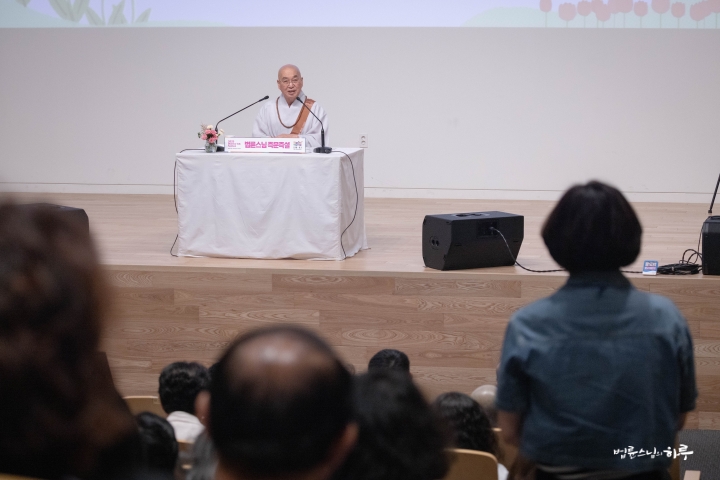
“If you endure, you’ll get stressed. If the company fires you, you can leave then. Don’t try to endure, but have the mindset of working comfortably until they fire you. Don’t quit first just because the work is hard. If you make the decision yourself, you’re likely to regret it, but if the company makes the decision, there’s nothing to regret. You might feel bad, but you won’t regret it. It’s the same when meeting people or doing business. If you think you’ll regret making the decision yourself, let the other person decide. I act in my own way, and if the other person still wants to be with me, I accept it. With this mindset, you can experience less stress. If the other person wants to end the relationship, then end it at that time. If you have this perspective, you can work comfortably.”
“After hearing Sunim’s words, I feel like I lack the strength to endure difficult things. So does that mean I can just act as I please when difficult moments come, whether at work or in daily life?”
“It’s hard because you’re forcing yourself to endure doing things you don’t want to do. For example, let’s say someone offers to pay ten million won for each slap on the cheek. Then getting slapped becomes not a difficult thing but rather an easy thing. Even if they say to take just one slap, you’d want to take ten more. In fact, there’s no such thing as ‘difficult work.’ It’s all created by the mind. It’s the same with dating someone you dislike. If they gave you 100 million won, it wouldn’t feel difficult, right? In the end, it’s not that the work is actually difficult, but it becomes difficult because I dislike that work. Conversely, for things you like to do, you’re willing to even spend money to do them, right? So if you find it really hard, you can quit. But most difficulties come from the mind.
‘Difficulty is not the work itself but something my mind creates. If I follow this mind now, I might suffer losses later.’ 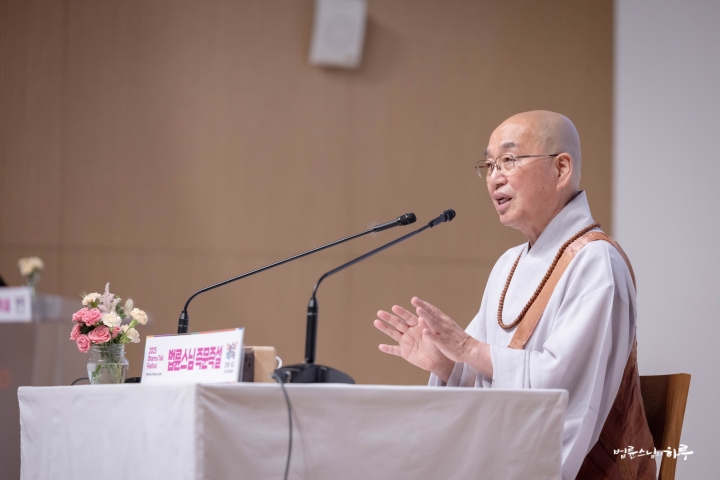
With this perspective, you can work without being swayed by difficult feelings. For example, let’s say your favorite food is laid out before you, but it contains poison. No matter how much you want to eat it, you shouldn’t. But listening to your story, it seems like you’re asking ‘How can I not eat it when I want to?’ In that case, I would answer ‘Then eat it and die.’
However, if you eat something poisonous just because you want to, it will ultimately harm you, right? Similarly, if your current work is too difficult, you can quit. But since that difficulty comes from the mind, if you move according to your mind, you might regret it later. That’s why I’m saying don’t give weight to the mind that says ‘it’s difficult.’ It’s just your habit that arises according to the situation. When that happens, even if it feels difficult, just do it. If you’re really so exhausted that you can’t do anything, then quit. Otherwise, just go to work day by day. When climbing a mountain, it gets hard when you’re about halfway up. Sometimes you want to stop. At such times, you can come down from the middle. There’s no reason you must go to the summit. But if you’ve set the summit as your goal, you must go even if it’s hard. At such times, you should keep going with the perspective of ‘The difficulty is just in my mind, I’m just going.’ If you are wavering on decision ‘Should I go down or not?’ it becomes even harder. Even though the body is tired, if you just do what you’ve decided to do, the defilements disappear.”
“Thank you. I understand well.”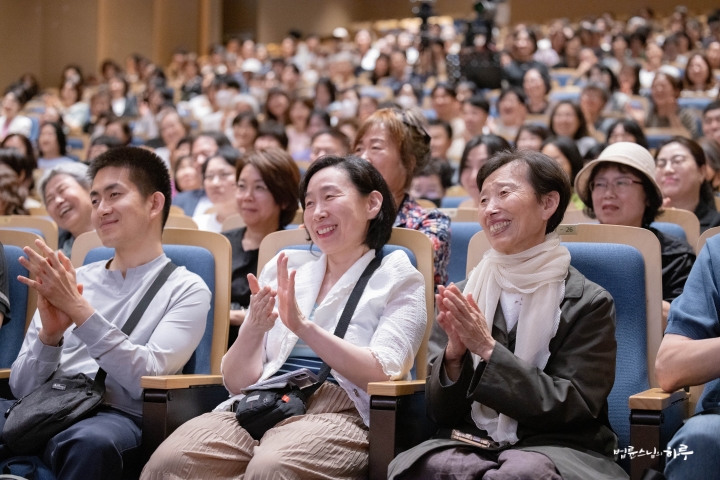
Questions continued one after another.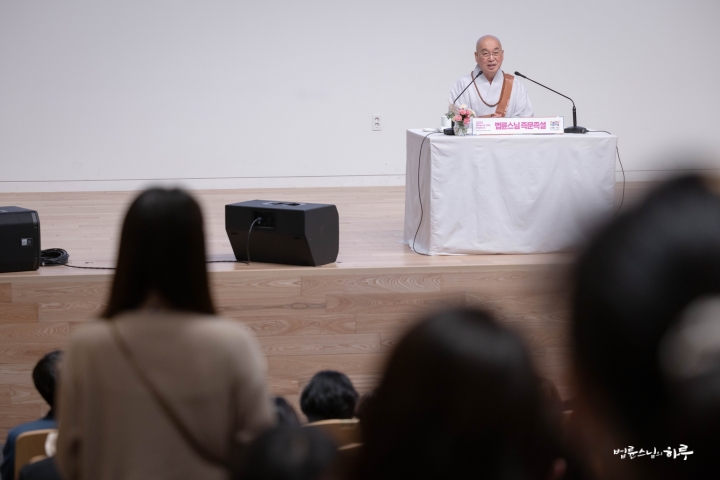
I’ve realized that I find joy in shopping and consuming. How can I get control of a shopping addiction?
After hearing the teaching that the world is impermanent and empty, I wonder ‘Is this the end?’ What practice should I do to go on the path of compassion?
When someone treats me badly, I treat them badly too, and when they treat me well, I treat them well. Is this wrong?
I’m raising two children alone after my husband passed away. My child keeps saying they’re sorry to me or saying things like ‘I’ll make sure you live well later.’ Why is that?
After finishing the dialogue, there was time to wrap up the 100-Day Dharma Talk. All the volunteers and Dharma Q&A participants presented a bouquet to Venerable Pomnyun Sunim, who had given Dharma talks tirelessly, with the hearts of all volunteers and participants.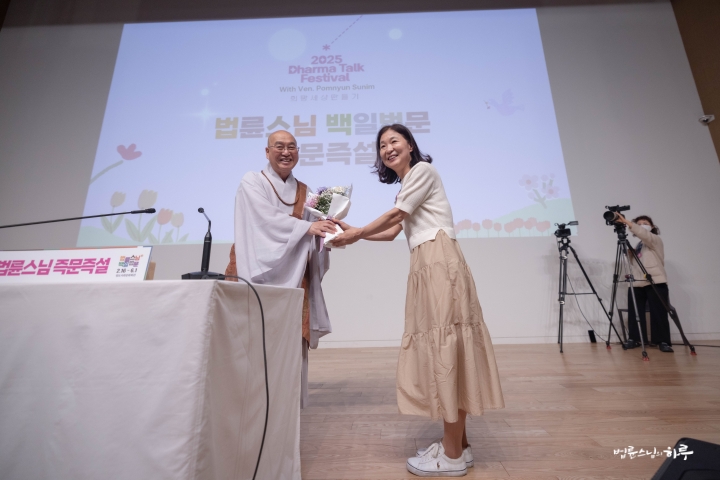
Sunim then introduced the volunteers.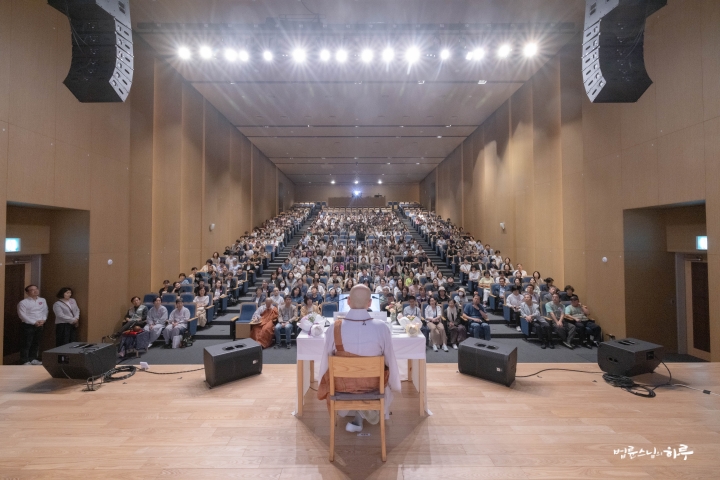
“About 700 volunteers worked hard to make this 100-Day Dharma Talk possible. Many people volunteered in various areas including building management, cleaning, guidance, meal service, booth operation, and curriculum management. Today, I’d like to introduce those who helped run the Friday Dharma Q&A sessions.
To you, it might seem like all that’s needed for a Dharma Q&A is just Sunim and the audience, but it was possible because so many people volunteered. Please give them a big round of applause.” 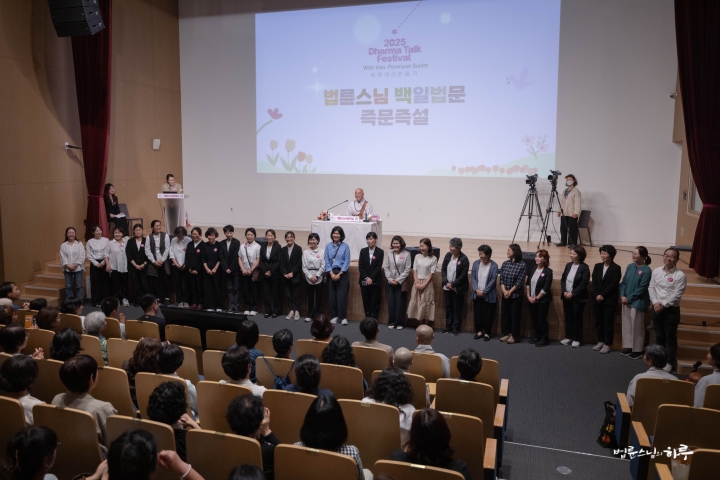
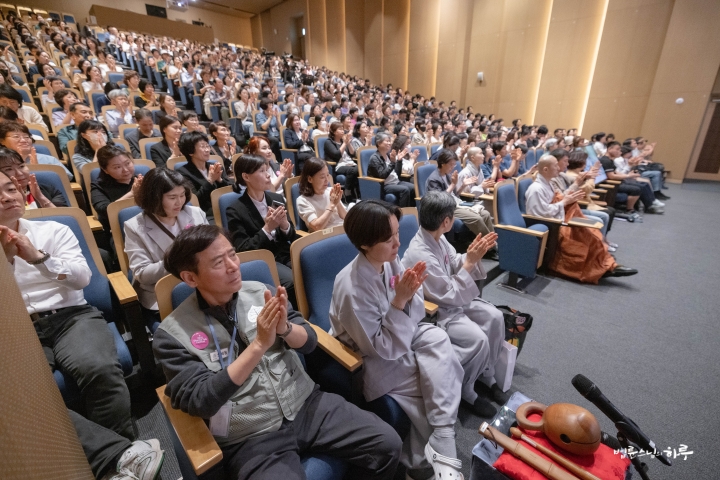
When all the volunteers came to the front of the stage, the audience expressed their gratitude with loud applause. The volunteers shouted a cheer together and returned to their seats.
“Weekly happiness routine – Friday Dharma Q&A, let’s do it together!”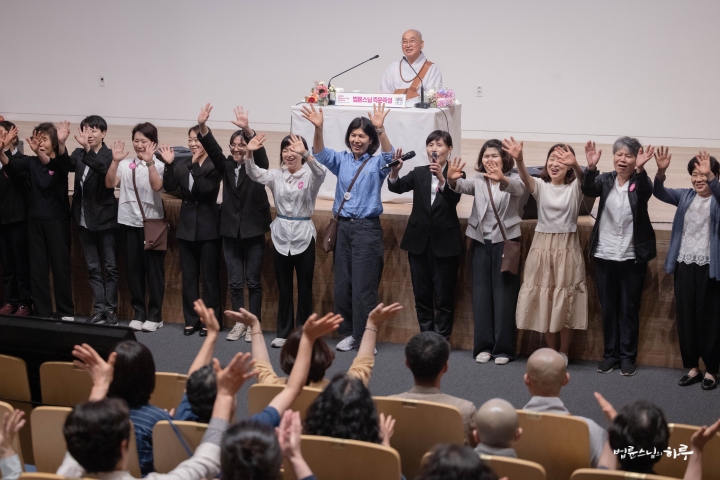
Next, Sunim heard thoughts and feelings from the volunteers who would be hosting the Friday Dharma Q&A sessions for the next 100 days.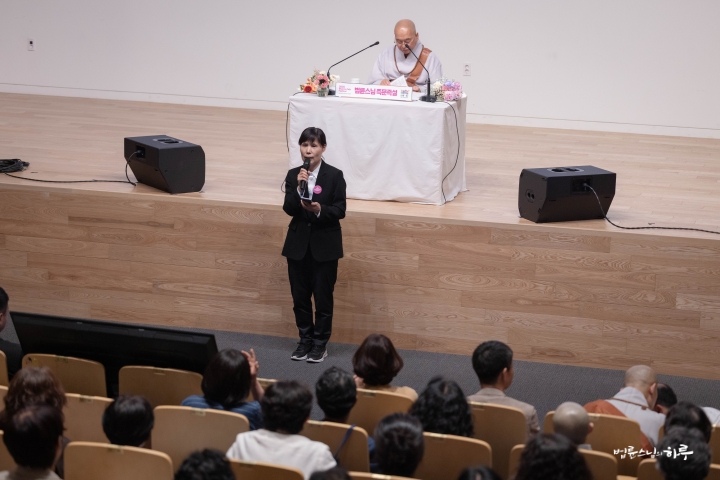
“Following Sunim and volunteering, I’ve been able to listen to Dharma talks and walk step by step through these 100 days. When we started the lectures on February 21st, 100 days ago, the weather was very cold. I’m happy that we’re concluding on a warm spring day with roses blooming after 100 days.”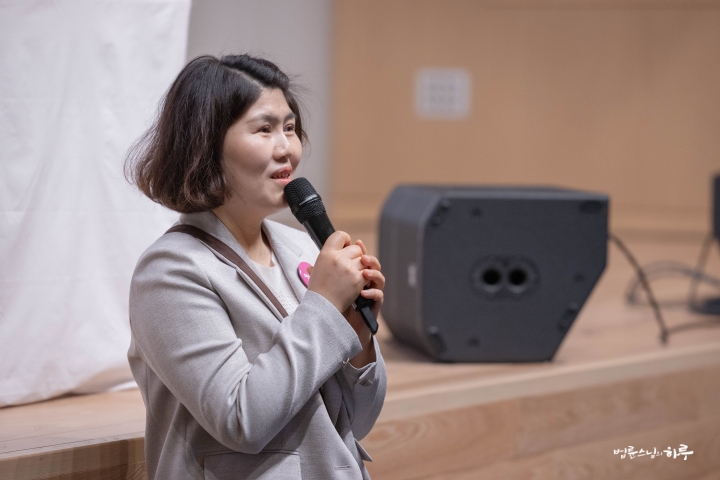
“Since I work full-time, I took time off every Friday to volunteer. While volunteering, I could see my mind changing more than twelve times a day. I thought I was a refined person with good character, but I wasn’t. So I realized that volunteering is truly a privilege of being a Jungto Society member. Whenever I felt stressed at work, I found healing through volunteering. Thanks to the immunity I built through volunteering, I’m now able to handle my work life more lightly.”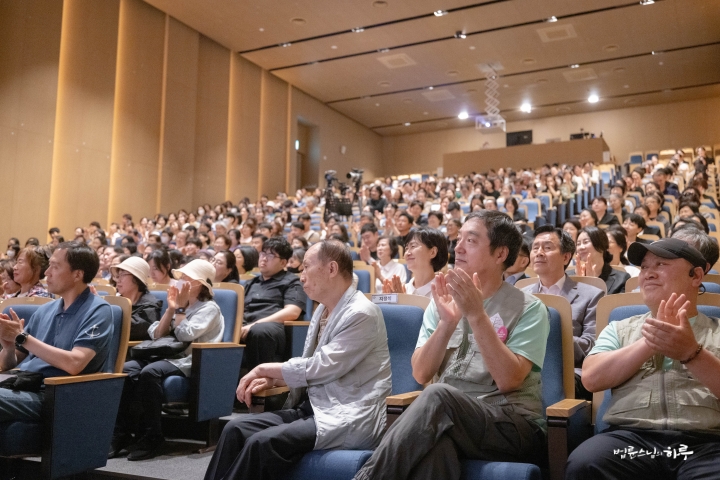
Finally, after watching a recap video capturing moments from the 100-Day Dharma Talk series, the morning session concluded.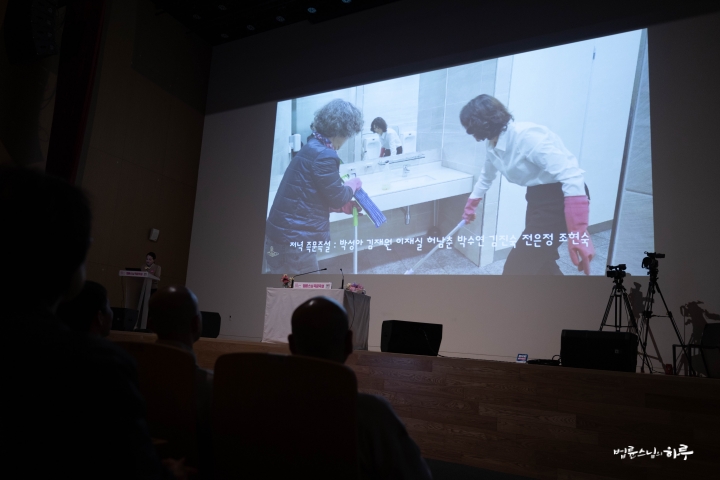
After coming down from the stage, Sunim went to the basement dining hall and had lunch with the community members.
After lunch, Sunim worked in the office in the afternoon. In the evening, Ms. Son Hee-sook from the Chester Net Family Foundation, a JTS supporter, visited to have dinner and tea with Sunim. Ms. Son expressed that she was deeply moved by the dedicated activities of Sunim and JTS volunteers and said she would continue to provide steady support.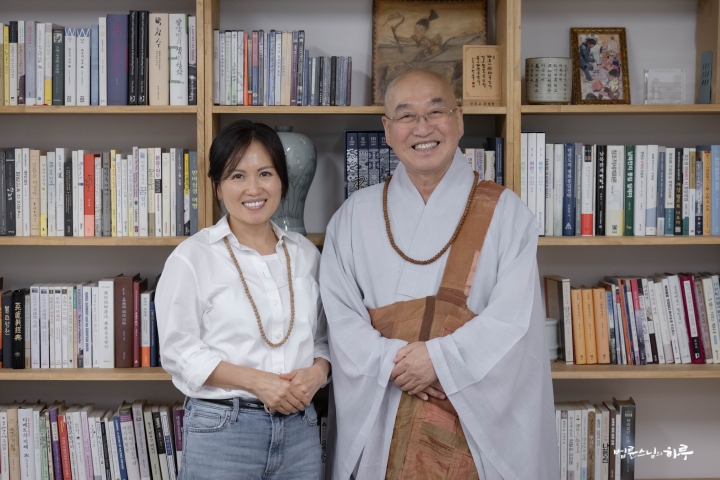
As the sun set, at 7:30 PM, the Friday Dharma Q&A session for working professionals began. This was finally the last lecture of the 100-Day Dharma Talk series.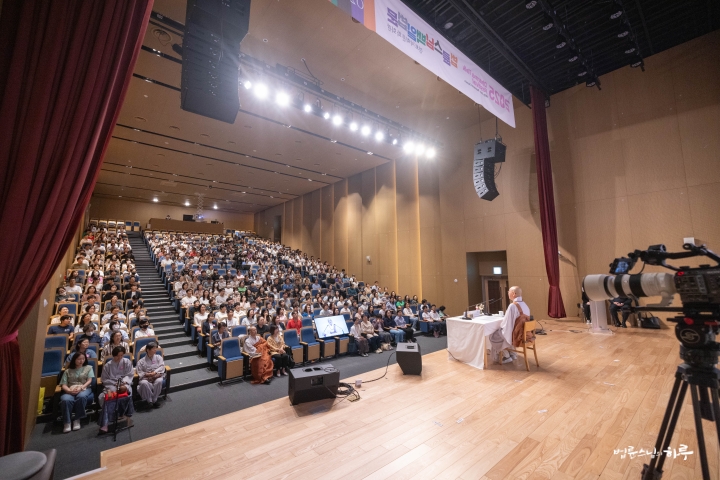
Many citizens came to the Jungto Social and Cultural Center after work to be part of this final session. About 5,000 people connected via YouTube, and around 230 people filled the underground auditorium.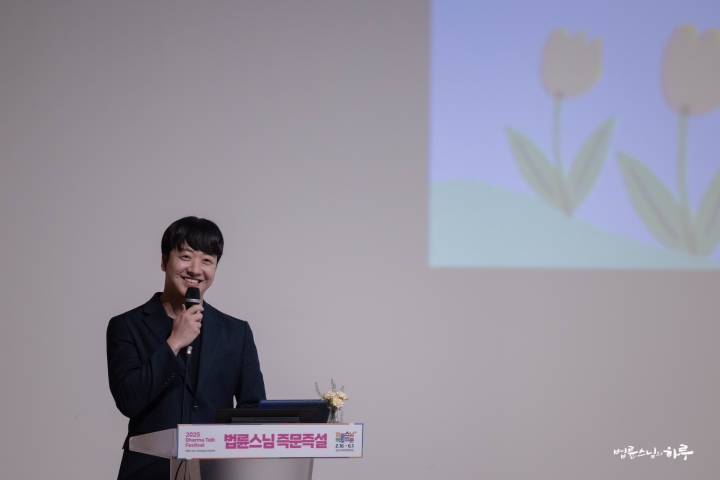
Today, before starting the Dharma Q&A, the Saebeot (a new friend) Choir, which creates beautiful harmony with South and North becoming one, performed songs.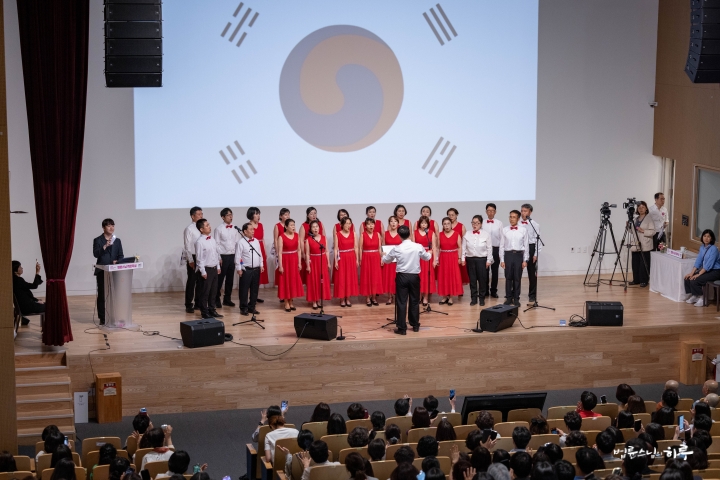
The Saebeot Choir is a South-North choir formed by members of the Jungto Society Hwaseong branch and North Korean defectors who joined after preparing together for the talent show at the Unification Sports Festival hosted by Good Friends last year. They sang two songs, “Spring in My Hometown” and “Beautiful Country,” carrying their wish for unification.
Living on this land with a vast ocean and blue sky,
am I not a happy person ♬
Beautiful Country
When the passionate singing ended, encores and cheers erupted from the audience. Everyone gave warm applause to the Saebeot Choir for their beautiful harmony of South and North becoming one.
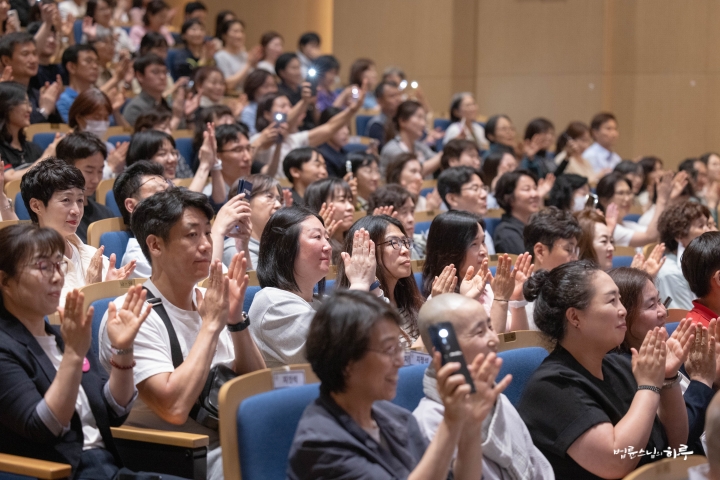
After reciting the Three Refuges and Words for Practice, Sunim took the stage. Sunim began the conversation with the hope that this song that resonated in Seoul today would someday resonate in Pyongyang as well.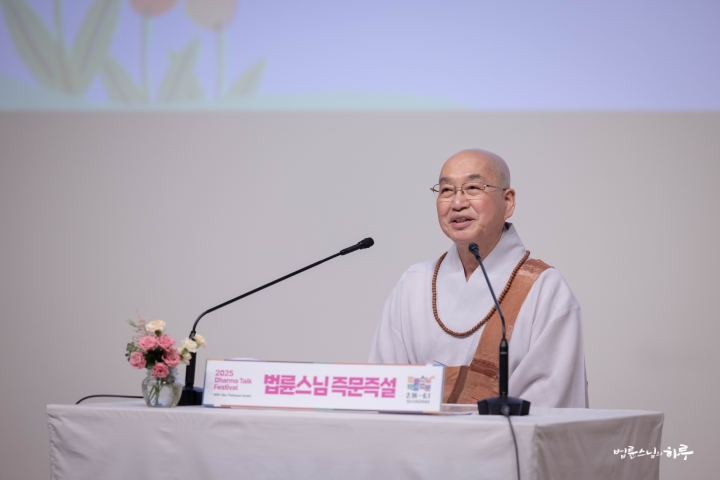
“Today we started the lecture with beautiful songs. For that moment, we were living in a unified country. It was wonderful to see South and North singing together as one. However, the reality is that South and North are confronting each other as two hostile states, facing the danger of possible war. But with President Trump’s re-election in the United States and the failure of the December 3rd martial law in Korea, the risk of war has decreased significantly. I hope the day comes soon when a new government in Korea and President Trump’s North Korea cooperation policy succeed, creating a peaceful Korean Peninsula. How much must those who came from North Korea miss their hometown? Let’s work together so that the day comes when they can return to their hometowns. I hope you all first practice mind cultivation to become free from suffering, and at the same time contribute to making our world a little more beautiful by sharing your talents and wealth.”
For the next hour and a half, Sunim received questions from six people and engaged in dialogue. One of them had gone abroad to study and lived in an isolated environment, resenting the world and blaming himself. He asked Sunim for advice on how to escape from self-blame.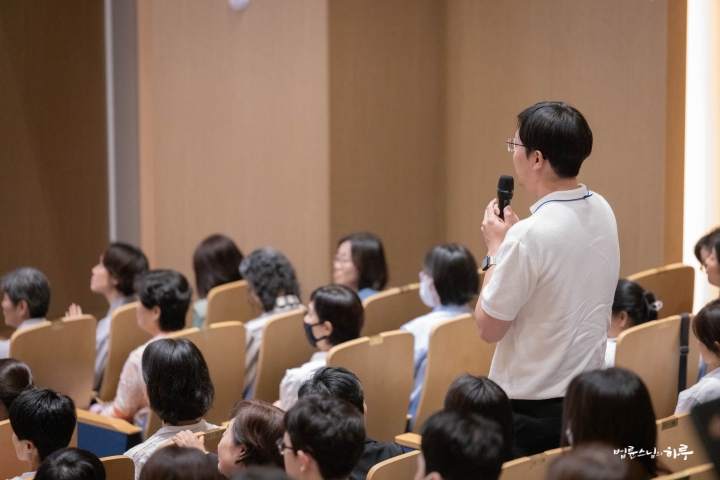
How Can I Heal My Mind That Constantly Blames Itself?
“First, it’s better to accept that the ‘worthlessness disease’ won’t disappear easily and will continue to repeat. Since habits don’t change easily, you have no choice but to accept this as a handicap and live with it. If you injured your leg, you’d have to live with the inconvenience of limping. If you accept that inconvenience, everything else can be fine and you can live happily. But if you keep making that one inconvenience a problem, your entire life becomes unsatisfactory. You just need to accept what’s lacking, but by not accepting it, you ruin your whole life. If you keep obsessing over what you don’t have, your entire life gets destroyed. Since the ‘worthlessness disease’ can’t disappear instantly, you need to be prepared for it to continue repeating. Accept this as a handicap and be satisfied with other aspects of your life. Though it’s not 100 points, be grateful it’s at least 98 points and live accepting that.”
Second, you need to think about why the ‘worthlessness disease’ develops. This disease doesn’t arise because you’re actually worthless. Rather, it arises from wanting to be exceptional. Because you don’t achieve as much as you desire, the ‘worthlessness disease’ develops in that gap. You feel worthless because your abilities don’t rise to match your desires. So the way to eliminate this disease is simple: let go of the desire to be exceptional. When there’s an object, a shadow appears, but if you remove the object itself or turn off the light, the shadow disappears too. There’s no use trying to eliminate the shadow. Just as you need to remove the object that’s the fundamental cause, you need to let go of the thought ‘I want to be exceptional,’ which is the root of the ‘worthlessness disease,’ for the disease to disappear. 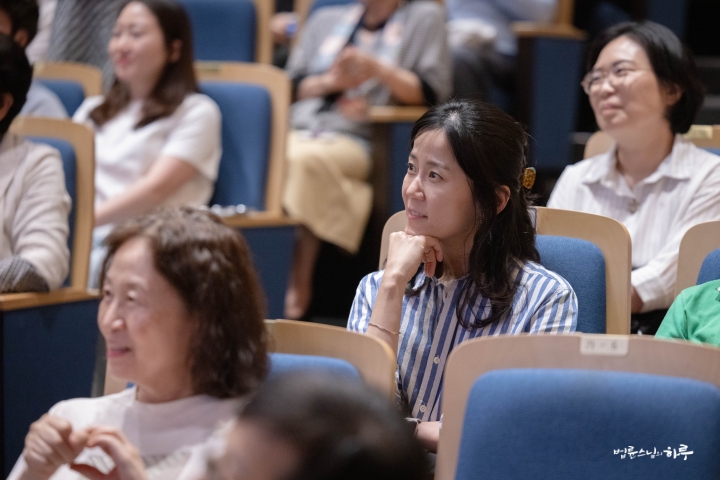
The desire to excel itself is not a problem. You need to have the perspective that if things go well, that’s great, and if they don’t, that’s fine too. If someone is about 175cm tall, they’re not considered short among the general population. However, if they want to become a basketball player, they might feel short compared to other players, and that’s where the ‘inferiority complex’ develops. Height itself has nothing to do with being inferior or superior. The ‘inferiority complex’ ultimately comes not from one’s existence but from one’s psychology. If you’re short, you should either quit basketball or develop skills to overcome that handicap, but the problem is just dreaming the futile dream of ‘if only I were a bit taller.’
Similarly, if you’re studying in Germany and want to speak German perfectly like a native German, that’s also greed. Speaking a non-native language fluently is realistically impossible due to brain structure and language systems, yet people often dream of such things. You actually have no real problem, but you’ve caught the ‘inferiority complex’ because your obsession with ‘excelling’ has gone too far. You need to accept that you’re an ordinary person who isn’t much different from others. Letting go of the thought that you ‘must excel’ is the first step. There’s no reason you must get a PhD either. Like me, you can live without any problems even without a degree. Having just a master’s degree, or even just a bachelor’s degree, is actually quite remarkable. Your thought that you should have gotten two PhDs is a futile thought. By that logic, I should have gotten about ten PhDs by now. (Laughter) 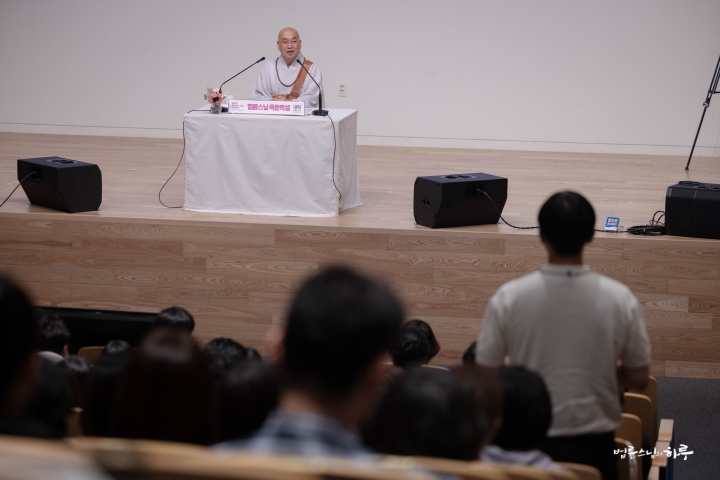
If you live holding onto the past, you’ll ruin your future. When someone suggests dialogue between North and South Korea, some criticize them as ‘pro-North Korean communists,’ and when someone suggests cooperation with Japan, others condemn them as ‘pro-Japanese collaborators.’ These are all perspectives bound by the past. Problems cannot be solved this way. While we should address the past as the past, we need to prioritize the future to resolve international relations.
Personal life is exactly the same. While it’s good to learn from past failures, you shouldn’t live bound by them. Whatever you did in the past, no matter how well you did, it has nothing to do with the present. Past successes can become attachments, and childhood wounds are just past traumas. That’s why you need to look at the present and future with the perspective that ‘I have no problems right now.’ You are neither inferior nor superior. You only become inferior because you set a standard that you ‘must be superior.’ There is originally neither superiority nor inferiority. Every being is precious in itself.
If the studies you’re doing now are necessary, that’s good. But if you’re studying to overcome a complex, that’s not a good motivation. If the reason for studying in Germany was to get a doctoral degree, but you keep holding onto that past goal, your study abroad in Germany becomes a failure. However, being born in South Korea and living in Germany itself is a rare and valuable opportunity. Meeting your wife in Germany and getting married is also a good thing. What does it matter whether you got a master’s degree or work at a company? You develop an inferiority complex because you’re obsessed with your initial goal. I originally wanted to become a scientist too. But somehow I became a monk. If I had kept holding onto that dream of being a scientist, my life would have been a failure, right? But looking back, becoming a monk is also fine. In some ways, it’s even better than becoming a scientist. (Laughter) 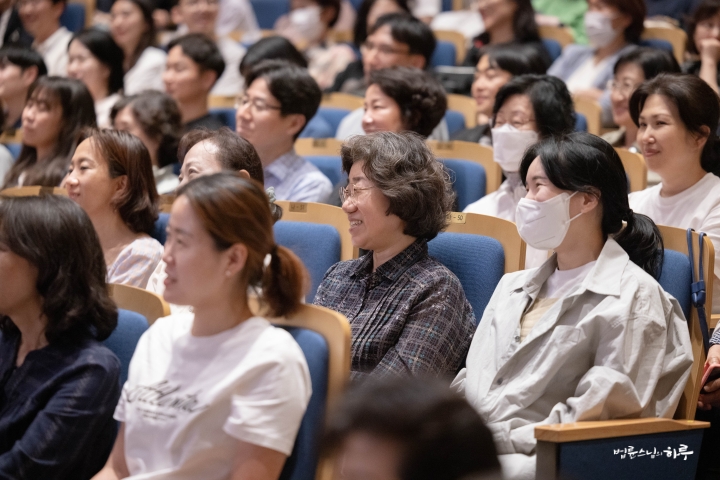
Ultimately, we cannot say which is better. If you adopt the perspective of letting go of such thoughts and just living, you’ll realize that being superior or inferior is merely a distinction. When you know you’re not superior, you’re also not inferior. While you can instantly realize that you’re no longer inferior, it’s difficult to achieve this immediately today due to long-standing habits. That’s why adopting the perspective of simply living with the thought of being inferior when it arises can be a practical approach.”
“Yes, thank you.”
Questions continued one after another.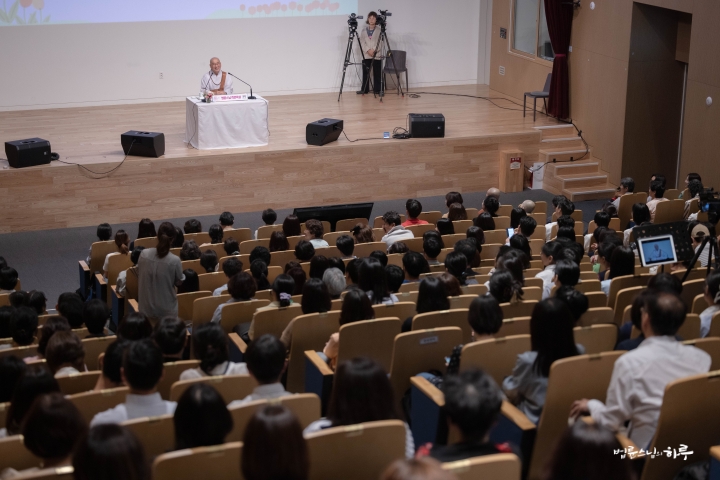
My husband has political ambitions, so we’ve decided to live our own ways. My second child needs to get married, but how should I maintain my relationship with my husband going forward?
My boyfriend’s mother opposes our marriage, saying we’ve only known each other for a year. My boyfriend says he needs his mother’s permission to marry. What should I do?
I started working as a daycare teacher because I love children, but as my career has progressed, administrative work has reduced the time I spend with children. I’m wondering if building my career this way is right.
I’m suffering at work, my living conditions are poor, my parents who used to help before marriage are no longer here, and I’ve developed depression. Since the work issues aren’t easily resolved, I’m considering quitting my job.
When someone asks if I’ve ever been sexually harassed in the past, if I answer according to Buddhist teachings that I haven’t had such an experience, wouldn’t that be lying?
After finishing the dialogue, it was 9 PM.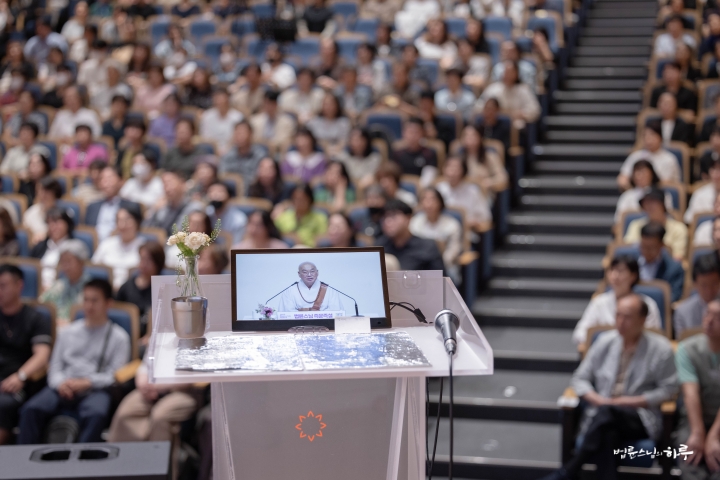
Next, they had time to wrap up the 100-Day Dharma Talk. First, Sunim personally introduced the volunteers who had worked hard to organize the Friday Dharma Q&A.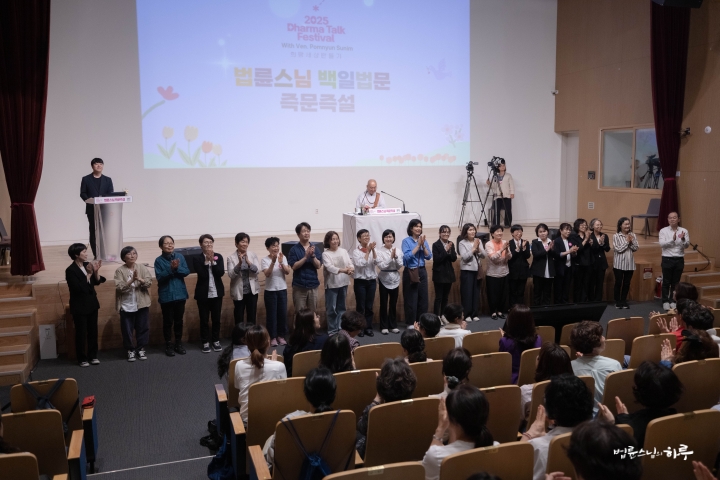
“Many volunteers have worked hard. Those who worked the hardest are the questioners. By willingly sharing their difficult inner stories in front of the gathered audience, dialogue was made possible. Thanks to them, we were able to understand the inner wounds of humans and learn how to heal those wounds.
And many volunteers have also worked hard to manage and operate the Jungto Social and Cultural Center. Today, I’d like to introduce those who have been running the Friday Dharma Q&A program. Please come forward.”
As the volunteers walked to the front of the stage, the audience gave them a big round of applause.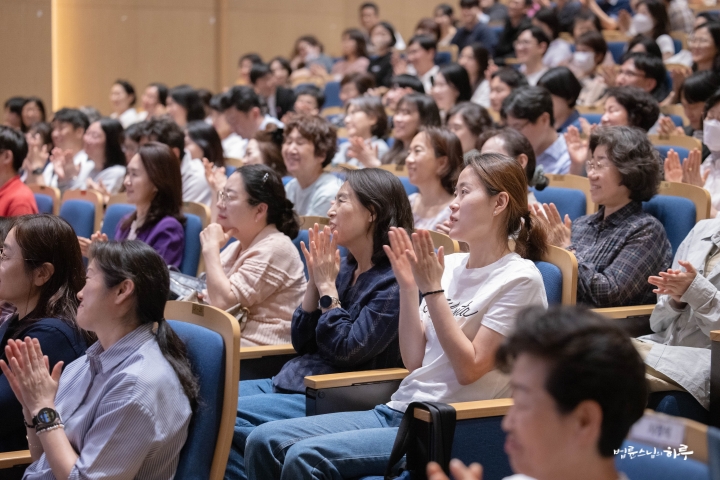
Next, representing the hearts of all volunteers and participants, they presented a bouquet to Venerable Pomnyun Sunim, who had given Dharma talks tirelessly.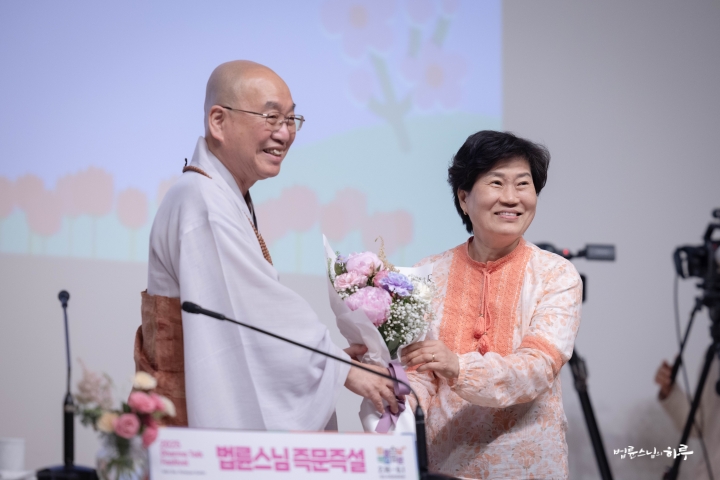
Then they had time to hear speech from two representatives of the volunteers.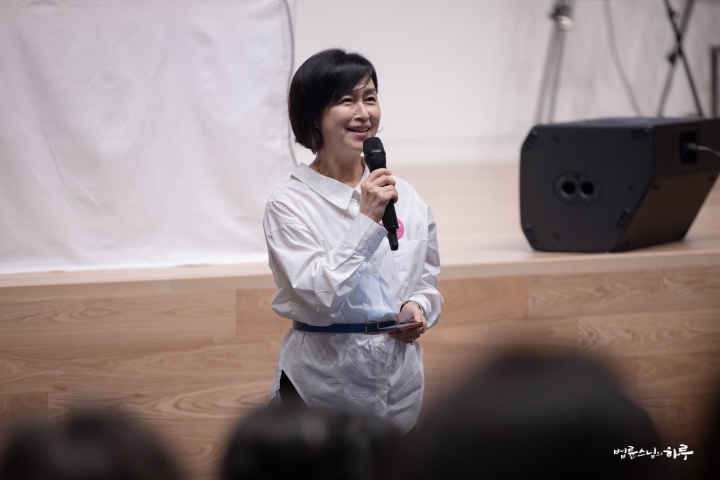
“While volunteering and dealing with many people, I struggled with a lot of judgmental thoughts. However, through fulfilling my duties, I was gradually refined. I’m grateful for this time as I could see myself developing little by little over the hundred days.”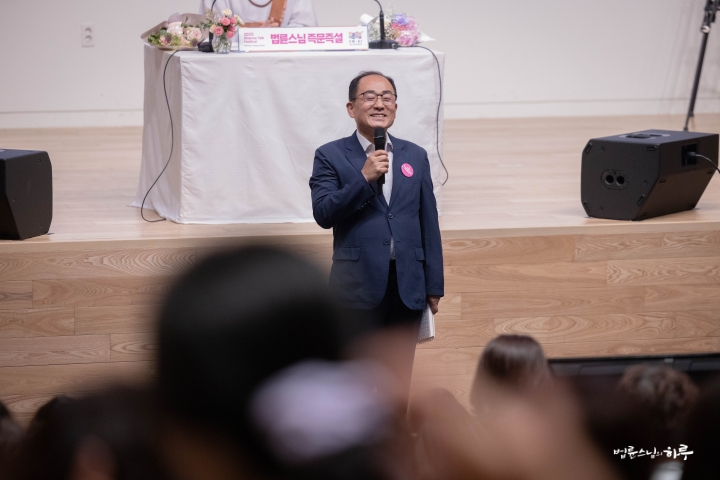
“I was very happy to see the faces of citizens brighten as they listened to the Dharma talks, and I felt very rewarded. When someone asked me to do something and I said ‘yes,’ my heart became increasingly happy. I hope you all get a chance to experience this joy of volunteering someday.”
Finally, after watching a video sketch of the Friday Dharma Q&A sessions together, they concluded the lecture with the Four Great Vows. With this, the 104-day journey came to an end.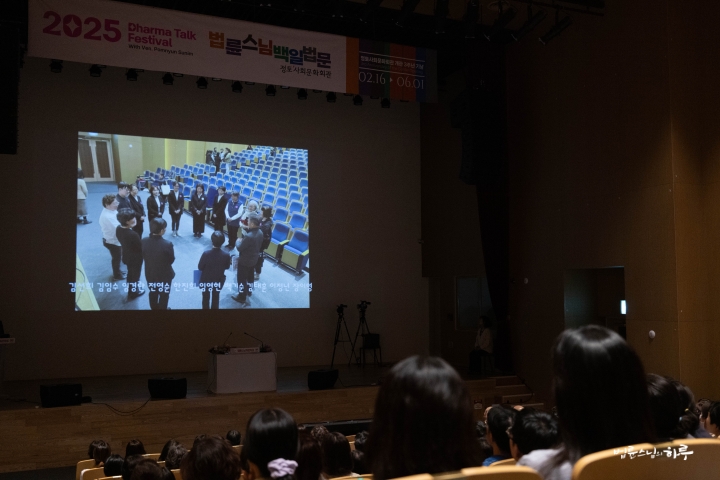
After leaving the lecture hall, Sunim took a commemorative photo with members of the Jungto Society Hwaseong branch who had performed in the choir.
“I enjoyed the performance.”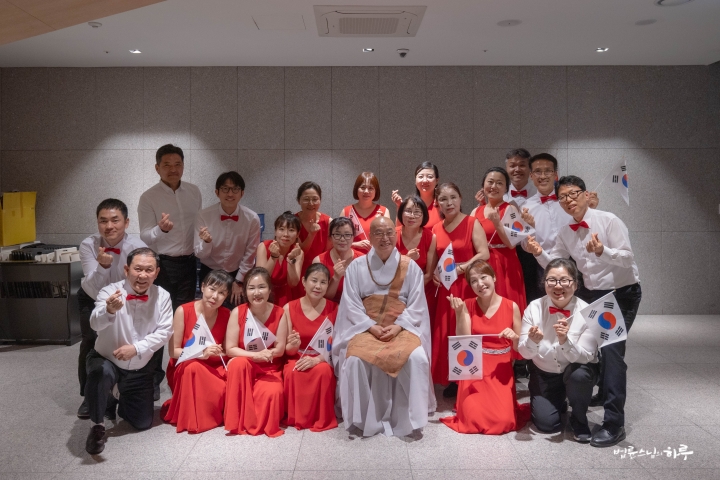
After exchanging greetings, Sunim returned to the Jungto Center and concluded the day.
Tomorrow morning, to commemorate the completion of the 100-Day Dharma Talk, there will be a special Dharma assembly with Venerable Bulsim Domun, an advisor to Jungto Society. In the afternoon, Sunim will attend the Peace Foundation’s Tongil Euibyung Conference for a Dharma Q&A session, followed by a meeting on the topic of “Youth Dharma Propagation” with the Special Youth Division and social activity units.





